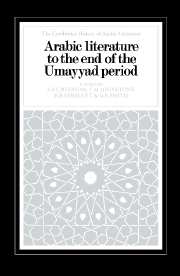Book contents
- Frontmatter
- Contents
- Editorial introduction
- 1 The tribes of pre-Islamic Arabia
- 2 The Umayyad Empire, c. A.D. 750
- 1 Background topics
- 2 Pre-Islamic poetry
- 3 Early Arabic prose
- 4 The beginnings of Arabic prose literature: the epistolary genre
- 5 The role of parallelism in Arabic prose
- 6 The Qur'ān-I
- 7 The Qur'ān–II
- 8 Qiṣaṣ elements in the Qur'ān
- 9 Aspects of the Qur'ān today
- 10 Ḥadīth literature–I: The development of the science of Ḥadīth
- 11 Ḥadīth literature-II: Collection and transmission of Ḥadīth
- 12 Shī'ī Ḥadīth
- 13 Narrative elements in the Ḥadīth literature
- 14 European criticism of Ḥadīth literature
- 15 The impact of the Qur'ān and Ḥadīth on medieval Arabic literature
- 16 The Maghāzī literature
- 17 The Sīrah literature
- 18 The poetry of the Sīrah literature
- 19 Fables and legends in pre-Islamic and early Islamic times
- 20 Umayyad poetry
- 21 Music and verse
- 22 The Greek impact on Arabic literature
- 23 The Persian impact on Arabic literature
- 24 The Syrian impact on Arabic literature
- Appendix Bibliography of translations of the Qur'ān into European languages
- Glossary
- List of sources
- Index
13 - Narrative elements in the Ḥadīth literature
Published online by Cambridge University Press: 28 May 2012
- Frontmatter
- Contents
- Editorial introduction
- 1 The tribes of pre-Islamic Arabia
- 2 The Umayyad Empire, c. A.D. 750
- 1 Background topics
- 2 Pre-Islamic poetry
- 3 Early Arabic prose
- 4 The beginnings of Arabic prose literature: the epistolary genre
- 5 The role of parallelism in Arabic prose
- 6 The Qur'ān-I
- 7 The Qur'ān–II
- 8 Qiṣaṣ elements in the Qur'ān
- 9 Aspects of the Qur'ān today
- 10 Ḥadīth literature–I: The development of the science of Ḥadīth
- 11 Ḥadīth literature-II: Collection and transmission of Ḥadīth
- 12 Shī'ī Ḥadīth
- 13 Narrative elements in the Ḥadīth literature
- 14 European criticism of Ḥadīth literature
- 15 The impact of the Qur'ān and Ḥadīth on medieval Arabic literature
- 16 The Maghāzī literature
- 17 The Sīrah literature
- 18 The poetry of the Sīrah literature
- 19 Fables and legends in pre-Islamic and early Islamic times
- 20 Umayyad poetry
- 21 Music and verse
- 22 The Greek impact on Arabic literature
- 23 The Persian impact on Arabic literature
- 24 The Syrian impact on Arabic literature
- Appendix Bibliography of translations of the Qur'ān into European languages
- Glossary
- List of sources
- Index
Summary
One of the greatest of the infidels killed at Badr, which was the first victory for the fledgeling forces of Islam, was the renowned Nadr b. al-Hārith. His death was lamented by his sister in an elegy of moving eloquence; the Prophet is reported to have felt so much sorrow when he heard this poem that he said he would not have allowed Nadr to be killed, if he had heard the poem before his death.
Nadr was learned in Persian literature, and his opposition to the Prophet and to Islam took the strange form of interpreting this struggle as a contest of excellence in storytelling. “I am a better teller of tales,” he asserted; “Muhammad tells tales from the past, but I relate the histories of the great Persian heroes, Rustam and Isfandiyār.” He had such success in vexing the Prophet that it was he who ordered Nadr to be killed at Badr, though it was rarely that he gave such orders, and to that extent it was out of character.
This narrative and other less well-known historical anecdotes show the hold that storytellers had over the Arabs even at this early date, and it gives an indication of the nature of this kind of popular oral literature, often based on a core of heroic poetry.
Within this cultural milieu it was only natural for them to seek to weave new narratives around the life and deeds of Muhammad, the greatest of their heroes. But storytellers and other narrators, although they recognized this need and were capable of meeting it, were nevertheless handicapped in many ways.
- Type
- Chapter
- Information
- Arabic Literature to the End of the Umayyad Period , pp. 308 - 316Publisher: Cambridge University PressPrint publication year: 1983
- 3
- Cited by



